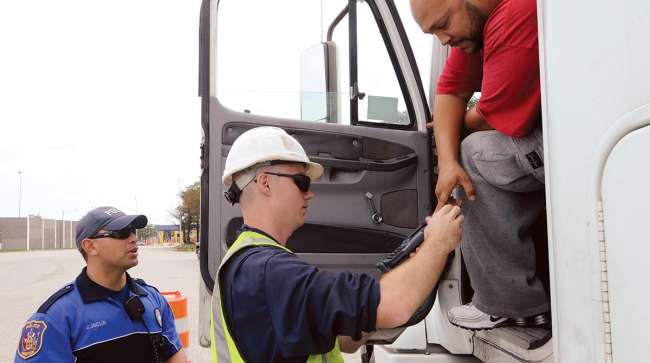Senior Reporter
Trucking Highlights Access to Military Bases in Defense Bill

[Stay on top of transportation news: Get TTNews in your inbox.]
Freight stakeholders are calling on congressional policymakers to further facilitate access to military bases and installations.
The groups, representing trucking as well as moving and storage companies, point to a provision tucked in the annual defense policy bill. The legislation is under consideration in the U.S. House of Representatives.
The stakeholders argue the provision would “represent meaningful and reasonable solutions that will benefit millions of people, especially those who require routine access to military installations.”
“Such access standards must be consistent across military installations, include procedures to facilitate recurring unescorted access for ‘covered individuals,’ and require [Department of Defense] to accept credentials that already exist for non-DOD personnel, such as the Department of Homeland Security’s Transportation Worker Identification Credential,” American Trucking Associations, ATA’s Moving & Storage Conference, the HomeSafe Alliance and the Government Freight Conference recently wrote to members of the Armed Services committees. Enhancing access at military bases and federal facilities for drivers via credentialing is a priority for ATA and its affiliates. The group continues to press ahead with efforts meant to assist companies that move household goods for military and civilian personnel.

Reps. John Garamendi (left) and Mark Alford led the legislative effort to enhance certain access to military facilities in the House.
“To be clear, truck drivers, motor carriers and household goods movers are [Department of Defense] partners, they are generally vetted by the federal government, and many have security clearances and/or other federally recognized security credentials,” they added.
The legislative effort to enhance certain access to military facilities in the House is led by Reps. Mark Alford (R-Mo.) and John Garamendi (D-Calif.).
“This critical piece of legislation ensures our military maintains its position as the world’s leading fighting force. It is absolutely essential that we prioritize readiness, innovation and the welfare of our service members over any divisive, nonmilitary-focused ideologies,” Alford said soon after the measure’s bipartisan approval in committee. “Through this legislation, we can align our resources and efforts toward fostering a resilient, robust and mission-focused military.”
“I am pleased to have worked in a bipartisan manner to ensure that this must-pass legislation addresses the critical issues for our military families and national security interests,” Garamendi said in a separate statement. “Now that the House Armed Services Committee passed this legislation with strong bipartisan support, I will work to ensure it passes Congress and is signed into law by President [Joe] Biden.”
Rep. Mike Rogers (R-Ala.), chairman of the House Armed Services Committee, called on colleagues to support the bipartisan legislation formally known as the fiscal 2024 National Defense Authorization Act.
Want more news? Listen to today's daily briefing above or go here for more info
The defense bill is scheduled for consideration in the House. Senate leaders are expected to proceed with consideration of their version. Typically, Congress clears the bill every year for the president’s signature.
“The bill expands access and significantly reduces the cost of child care for military families. It makes it easier for military spouses to find jobs when service members transfer stations. Finally, it improves the quality of military health care, especially mental health services for service members and their families,” Rogers said July 12. “This bill passed out of committee 58 to 1. It is the definition of a bipartisan bill. It will enhance congressional oversight of [Department of Defense].”

